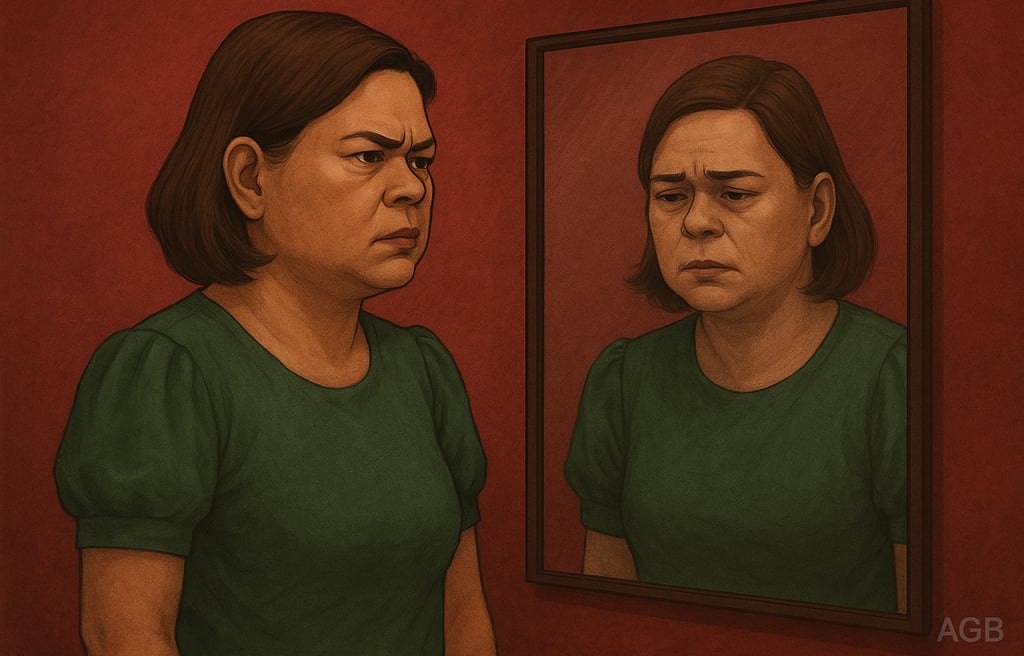Sara Duterte’s Downfall: Why I Pity Her, But Can’t Support Her
This blog takes a hard, honest look at Sara Duterte’s political collapse—tracing her flip-flops, misuse of public funds, threats, and public unraveling. While many still defend her, this piece argues that pity is not a reason to support someone who has repeatedly failed to lead with integrity, accountability, or competence.


There are days I wonder if Sara Duterte ever sits in silence. Not during press cons. Not during rallies. Just... alone. No cameras. No speeches. Just her and her thoughts.
Because if she ever did that—truly sat with the weight of what she’s done, what she’s lost—I think she’d realize she’s no longer feared. Just pitied.
And that might be worse.
I don’t say that with smugness. I say it as someone who’s watched her undo herself, one contradiction at a time. Her story isn’t just about downfall. It’s about denial. And it’s hard to support someone who keeps proving, in public, why they shouldn’t be trusted with power.
The Contradictions That Broke Her
Sara Duterte’s biggest enemy was never the opposition, nor the Marcoses, nor the press.
It was her own mouth.
In 2024, fact-checkers found that almost two-thirds of her 28 public claims contradicted what she’d previously said (Vera Files). These weren’t clarifications. These were flip-flops that made it impossible to know where she actually stood. And worse, they showed a pattern: say what works in the moment, deny it later, then deflect the backlash.
She tried to reinvent herself as a defender of an “independent foreign policy” (The Global Filipino Magazine), insisting she was “not pro-any country” (Inquirer). But her actions told a different story. She openly criticized the Philippines' stronger military cooperation with the United States, particularly the deployment of U.S. missile systems meant to counter Chinese aggression (Manila Times).
And yet, when China’s coast guard harassed Filipino fishermen or blocked supply missions in the West Philippine Sea, she said nothing (Philstar). Her call for the Philippines to "stay in the middle" between superpowers would be reasonable—if it wasn't lopsided. Because neutrality doesn't mean silence when your own people are under threat. Her refusal to name China in those moments? That wasn’t balance. That was betrayal (Inquirer).
Her critics aren’t basing these accusations on gut feel. They’re watching her mimic Beijing’s talking points while ignoring China’s repeated violations of our sovereignty. That kind of silence speaks louder than any press release. And that kind of loyalty? It doesn’t look Filipino.
Her Failures in the Education Department
As Education Secretary, she had the biggest budget in government: ₱924.7 billion in 2024. And yet, what did she do with it?
The Commission on Audit revealed that out of the ₱11 billion allocated for computerization programs, her department spent just ₱2.75 billion (Manila Bulletin). Teachers had to use their own money for laptops while equipment worth millions sat unused in warehouses (Manila Bulletin). Meanwhile, she managed to spend 143% of her confidential funds—blowing through ₱125 million without blinking (Manila Bulletin).
It wasn’t just bad math. It was bad leadership. She prioritized secrecy over transparency, speed over substance. Worse, she appointed military men—retired generals with no educational background—to civilian roles in DepEd (PIDS). That wasn’t innovation. That was ignorance dressed as authority.
She had all the resources. She had the power. And still, she left the classroom behind.
From Words to Threats
Things didn’t stop at bad policy. Her behavior took a darker turn.
In November 2024, she admitted on national media that she told someone, "If I get killed, go kill BBM, Liza Araneta, and Martin Romualdez. No joke" (Al Jazeera). That’s not just reckless. That’s a threat.
The result? Criminal complaints for sedition and grave threats (AP News). Then came more erratic statements: wanting to "cut off" the President’s head (Philstar). Threatening to exhume the remains of Ferdinand Marcos Sr. (Philstar).
Some wondered if she was mentally unstable (Philstar). Others, like political analysts, said it more bluntly: she was acting like a wounded animal—someone who believes she's under siege and refuses to take responsibility for her own actions (Philstar).
The Impeachment Nobody Wanted but She Earned
Eventually, all of it came to a head.
Sara Duterte became the first sitting Vice President in Philippine history to be impeached (Wikipedia). The articles filed against her weren’t a stretch. They included the assassination threats, malversation of over ₱612 million in confidential funds, bribery, corruption in DepEd, unexplained wealth, links to extrajudicial killings, and efforts to destabilize the government (GMA).
Her response? She called the charges "a scrap of paper." No remorse. No reflection. Just another shrug (GMA).
Defending the Indefensible
When asked why she resigned as Education Secretary, she blamed "budget mishandling" (Manila Bulletin). But this came right after defending her confidential fund usage. Critics saw it for what it was: hypocrisy (Inquirer). She wanted sympathy without owning up to the damage.
And when her massive 389-person security team was scaled down—a team even larger than the President’s—she complained (The Diplomat). In a country where most public schools don't even have working toilets, that level of entitlement is insulting.
Every time she defends herself, she digs the hole deeper.
A Country That Wants Better
The bright side? People are starting to notice.
A 2024 survey showed that 33% of voters now prioritize candidates with real expertise and experience over name recall or popularity (BusinessWorld). Voters want transparency. Accountability. Real solutions, not family slogans (Grant Thornton).
We’re seeing new leaders rise—those who understand that governance is about building institutions, not building Instagram posts (UN Joint SDG Fund).
There is hope. But we can’t let it slip.
Where This Leaves Her
Sara Duterte’s unraveling isn’t just a fall from grace. It’s a warning.
When a public official says whatever suits them, spends like no one’s watching, threatens the very leaders she once aligned with, and refuses to take accountability—it catches up. Fast.
Her story is not one of sabotage from the outside. It’s implosion from within.
And while part of me genuinely feels sorry for her—for the isolation, for the damage she brought on herself—I still can’t support her.
Because the country deserves better. We deserve leaders who serve the people, not their egos. We need those who understand the job is to govern, not intimidate. To lead, not perform. To protect, not excuse.
The truth is, Sara Duterte didn’t just lose control of the narrative. She lost sight of the job.
And in this country, that kind of failure isn’t just political.
It’s personal.
Contact us
subscribe to morning coffee thoughts today!
inquiry@morningcoffeethoughts.org
© 2024. All rights reserved.
If Morning Coffee Thoughts adds value to your day, you can support it with a monthly subscription.
You can also send your donation via Gcash: 0969 314 4839.
